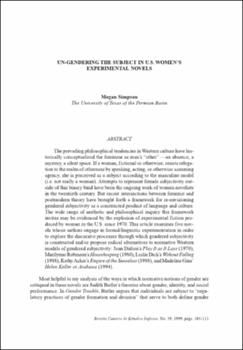Un-gendering the Subject in U.S. Women's Experimental Novels
Autor
Simpson, MeganFecha
1999Resumen
The prevailing philosophical tendencies in Western culture have historically
conceptualized the feminine as man’s “other” —an absence, a
mystery, a silent space. If a woman, fictional or otherwise, resists relegation
to the realm of otherness by speaking, acting, or otherwise assuming
agency, she is perceived as a subject according to the masculine model
(i.e. not really a woman). Attempts to represent female subjectivity outside
of this binary bind have been the ongoing work of women novelists
in the twentieth century. But recent intersections between feminist and
postmodern theory have brought forth a framework for re-envisioning
gendered subjectivity as a constructed product of language and culture.
The wide range of aesthetic and philosophical inquiry this framework
invites may be evidenced by the explosion of experimental fiction produced
by woman in the U.S. since 1970. This article examines five novels
whose authors engage in formal/linguistic experimentation in order
to explore the discursive processes through which gendered subjectivity
is constructed and/or propose radical alternatives to normative Western
models of gendered subjectivity: Joan Didion’s Play It as It Lays (1970),
Marilynne Robinson’s Housekeeping (1980), Leslie Dick’s Without Falling
(1988), Kathy Acker’s Empire of the Senseless (1988), and Madeline Gins’
Helen Keller or Arakawa (1994).





